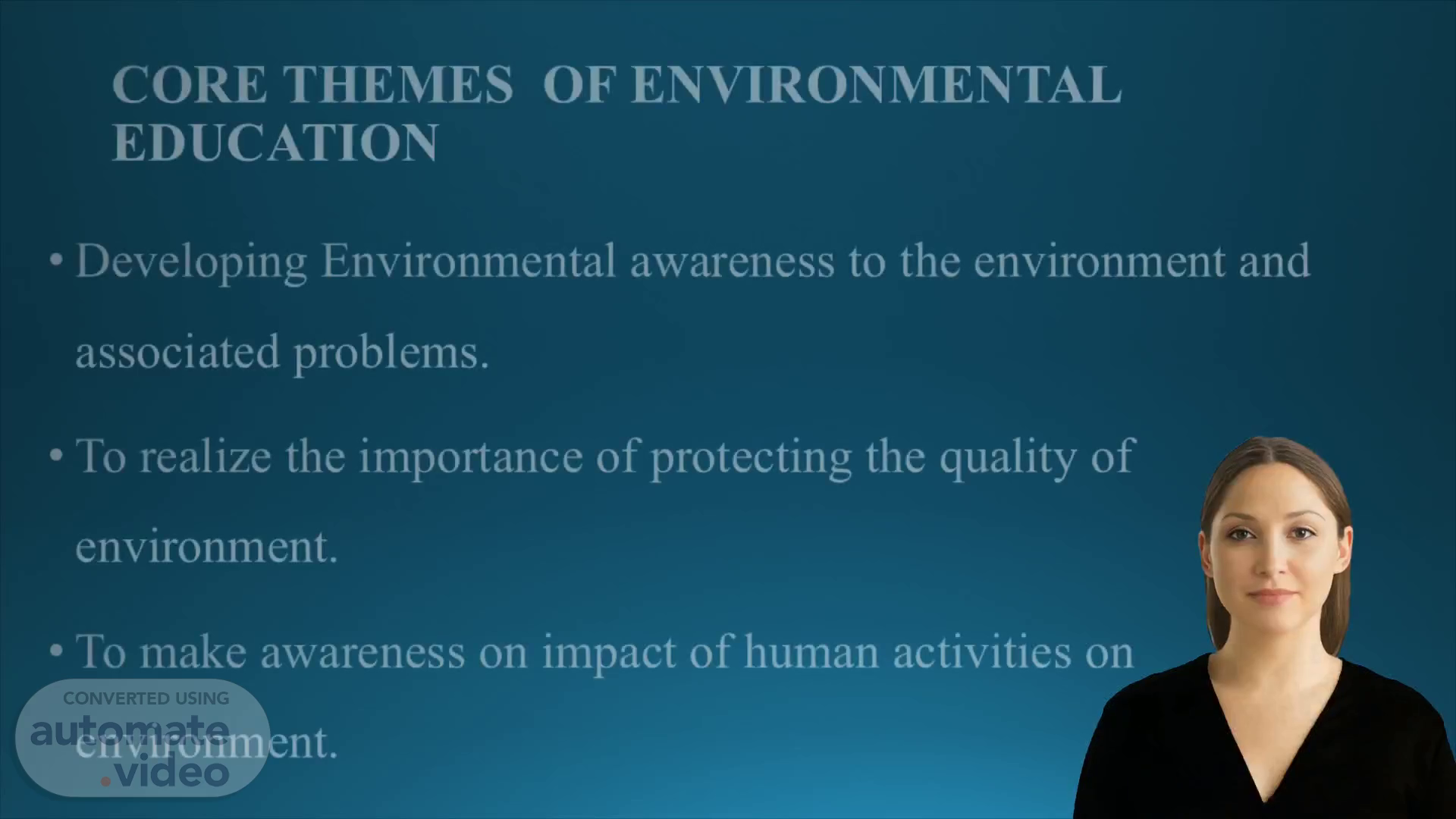
CORE THEMES OF ENVIRONMENTAL EDUCATION
Scene 1 (0s)
[Virtual Presenter] Good morning everyone, Today, I would like to present to you the importance of environmental education and the impact it has on environmental awareness and protection. Environmental education helps us understand the fragile balance between human activities and the environment which directly affects our well-being. Let us together investigate the different ways in which we can use education to protect our environment and nurture sustainable development..
Scene 2 (28s)
[Virtual Presenter] Environmental education refers to a set of actions designed to increase environmental awareness, knowledge, and skills. It helps students recognize the consequences of environmental issues and encourages them to think on how to use resources wisely to achieve sustainable development. Through this type of education, we seek to form attitudes and values that make people aware of the importance of nature and its conservation and at the same time, motivate them to participate in activities to protect it..
Scene 3 (1m 2s)
[Audio] Environmental Education encourages us to be aware of the environment and to protect it by making us aware of the repercussions of our activities. This slide focuses on natural resources and the problems and solutions related to them. We will look into renewable and non-renewable resources, examine natural resources, and analyze the issues associated with them. Furthermore, we will consider the part each of us has to play in preserving our natural resources and the background knowledge we need to make responsible and informed decisions..
Scene 4 (1m 37s)
[Audio] Environmental pollution and hazards are important issues that require attention and actions. Air, water, land, ocean and beach pollution, oil spills, noise pollution and hazardous waste can cause direct and long-term damage to our environment. It is important to educate ourselves and others on these issues, so that we can take steps to reducing or even eliminating them. By learning more about our environment and its needs we can work to preserve its health and safety for ourselves and future generations..
Scene 5 (2m 12s)
[Audio] Environmental education has become increasingly important in the last few decades as the human impact on the environment has become more pronounced. Global warming is one of the biggest environmental challenges today, brought about by rising average global temperatures and greenhouse gases in the atmosphere, leading to the "greenhouse effect". This contributes to damage of the Earth's ozone layer, making it susceptible to more harmful radiations, as well as acid rain, negatively impacting land and water ecosystems and leading to the extinction of various species due to destruction of their habitats. Environmental education promotes awareness of the importance of protecting the environment and encourages taking action to preserve it..
Scene 6 (2m 58s)
[Audio] Environmental Education is a powerful mechanism for raising public knowledge and understanding of environmental issues. It can help us see both the effects of our actions on nature, as well as the approaches necessary to protect and conserve it. To make people aware of the significance of preserving our natural resources and of decreasing their individual and collective impact on the environment, educational campaigns, lectures, debates and workshops can be organised. In India, several initiatives and programs have been put in place to protect the environment, such as solar energy projects and rainwater harvesting which are used to minimize the use of non-renewable power sources and promote better water conservation. It is also possible to use Environmental Education again to value the necessity of protecting our surroundings..
Scene 7 (3m 52s)
[Audio] Environmental education is an essential tool for increasing environmental consciousness and safeguarding our planet. We know individuals' activities have a massive influence, yet making responsible decisions can be difficult. Environmental education can provide us with tactics to both decrease our influence and generate constructive changes. In this class, we'll cover numerous facets of environmental management and defense. This includes soil management, water management, waste management, disaster management, global organizations, and Indian environmental movements and the functioning of their non-government organizations. I'm eager to explore all these topics with you..
Scene 8 (4m 40s)
[Audio] Environmental Education has grown in importance as human activity has placed a growing strain on the environment. It is essential that our students at school level understand the effects of their actions on the environment. Incorporating Environmental Education into the school curriculum is one way to ensure that this vital information is shared with students. This involves ensuring Environmental Education is available at different levels of the school, integrating Environmental Education into the curriculum and providing instructions on how to include it in school activities. Challenges in this process, however, exist, and the best solutions to them require the active participation of all the individuals in the educational institution. Thank you for your attention..